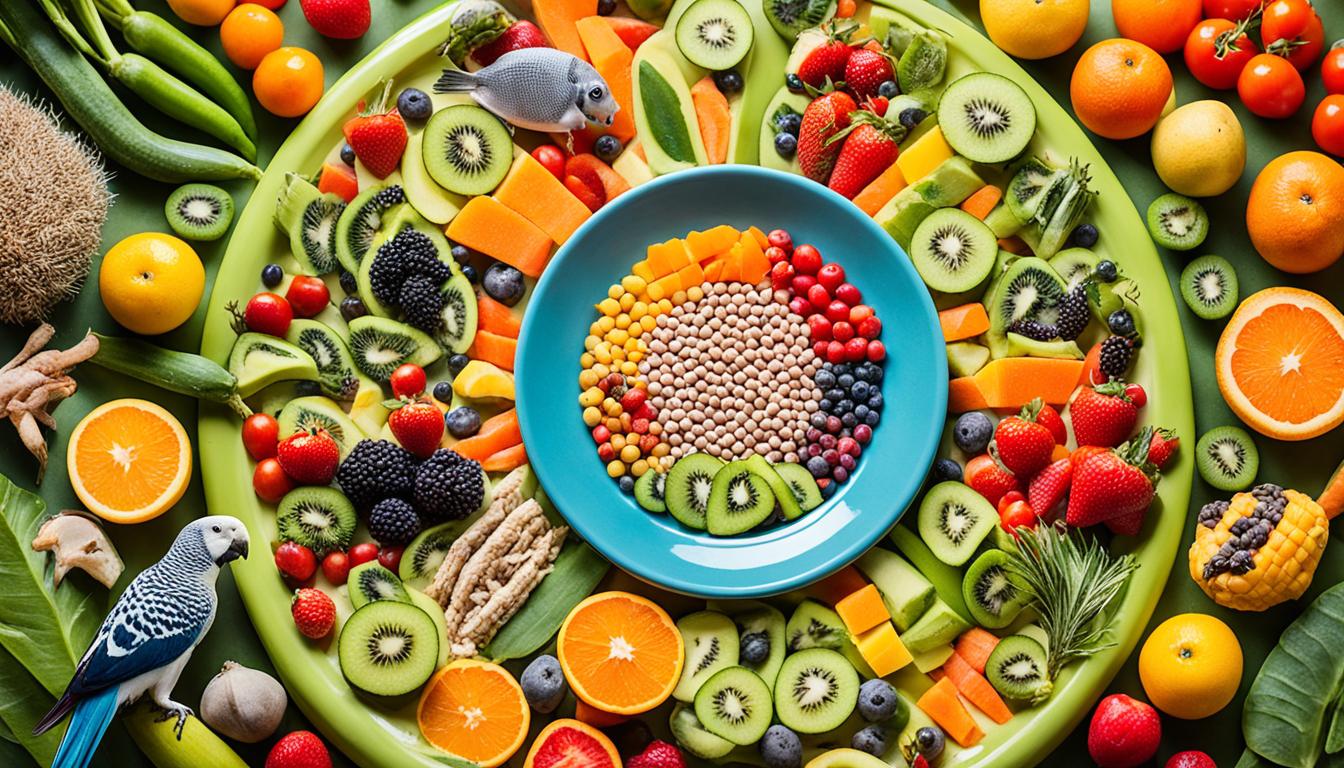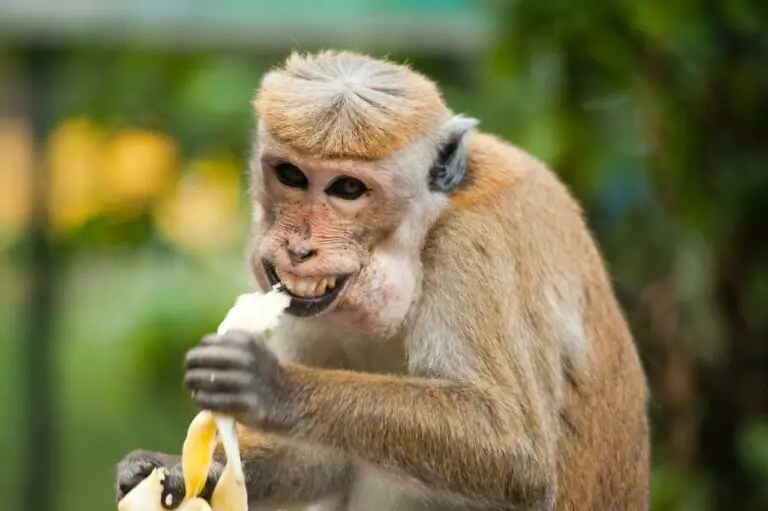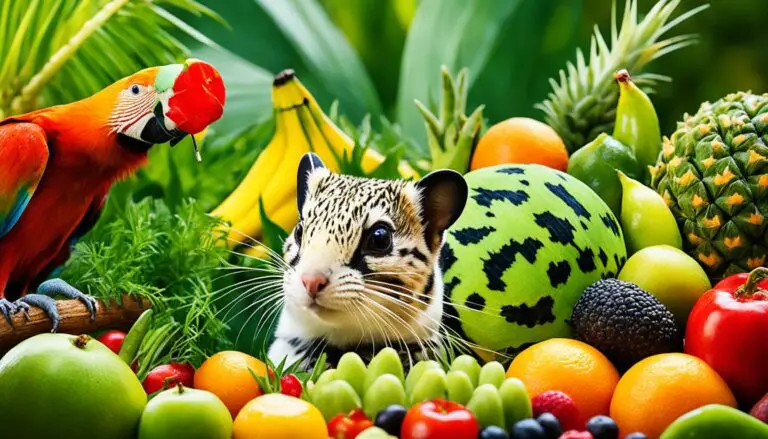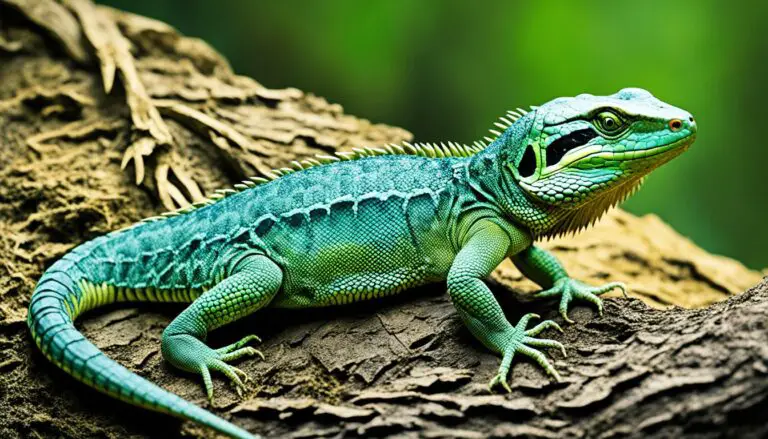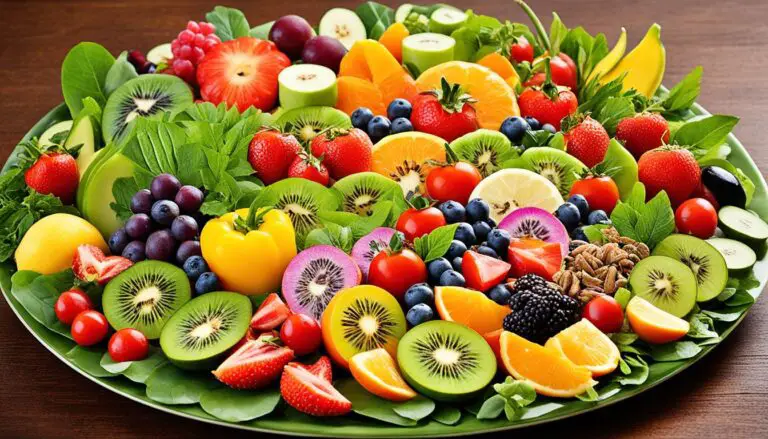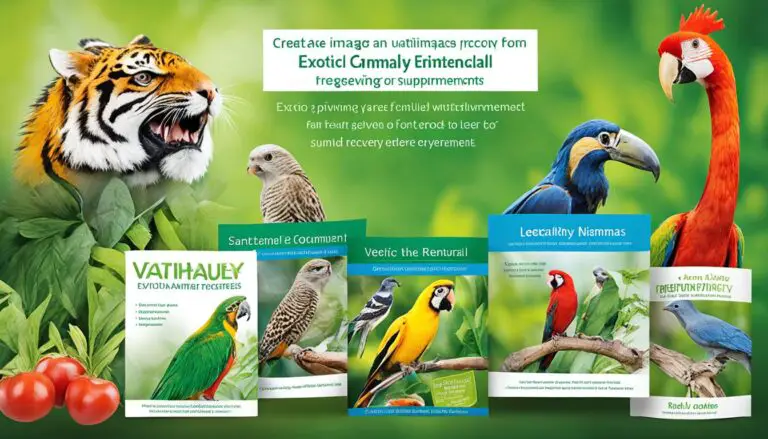Exotic Pet Nutrition for Chronic & Metabolic Issues
Did you know the right food is key for exotic pets with long-term health issues? These special critters need diets that fit their unique needs. This keeps them healthy and happy.
Exotic pets like snakes, parrots, and hamsters need specific foods. Some eat only plants, like rabbits; others, like sugar gliders, eat both plants and meat. It’s important to give them food that’s like what they eat in nature.
In this piece, we’ll talk about why good food matters for sick or metabolism-troubled exotic pets. We’ll cover what each type needs to eat for their health. With the right info, you can make sure your unusual pet does well on a diet made just for them.
Key Takeaways:
- Nutritional support is crucial for exotic pets with chronic illnesses or metabolic disorders.
- Exotic pets have diverse dietary needs based on their species, with different requirements for herbivorous, omnivorous, and carnivorous animals.
- Proper nutrition plays a vital role in managing the health conditions of exotic pets, such as metabolic bone disease and vitamin deficiencies.
- Consulting with a veterinarian or veterinary nutritionist is essential to create a specialized diet plan for your exotic pet.
- Providing balanced nutrition enhances immune function and overall vitality, ensuring optimal health and quality of life for exotic pets.
Understanding Exotic Pets’ Dietary Needs
Exotic pets are diverse, with unique dietary needs. It’s vital for their health to get the right food. They might need special diets due to health issues. Understanding these needs and talking to a vet is key.
Some exotic pets eat mostly plants. Others need both plants and animals in their diet. The aim is to feed them like they would eat in the wild.
Veterinarian guidance is important for pets with health issues. Vets know how to meet their unique dietary needs. They can recommend the best food and supplements.
Factors to Consider in Exotic Pet Nutrition
- Metabolic Disorder in Exotic Pets: Special diets are needed for pets with metabolic issues. The right food can help them feel better.
- Chronic Illness in Exotic Pets: Some pets may struggle to get nutrients from food. They might need diet changes and vet advice.
- Exotic Pet Nutrition Plan: Creating a custom diet for your pet is crucial. It ensures their health and fixes any nutrient problems.
- Veterinarian Guidance for Exotic Pets: Talking to a vet who knows about exotic pets is important. They help make a diet plan that’s just right.
To give your exotic pet the best, know their food needs and seek vet advice. This helps keep them healthy and happy.
Nutrition for Herbivorous Exotic Pets
Depending on the type of exotic pet, they might need different diets. Many are herbivores, eating plant fiber. Such diets offer vitamins like A and D3. They also give more calcium than phosphorus, helping keep pets healthy.
Planning a nutritious diet for these pets needs careful thought:
- Avoid much fats, oils, and proteins to keep digestion smooth. This cuts down on chronic illnesses.
- Foods like spinach, cabbage, and beet greens are high in thiocyanates and oxalates. They’re fine in small amounts, but too much can harm exotic pets.
- Adding a mix of foods ensures they get all the nutrients they need, maintaining their health.
- Supplementing with calcium, iodine, and vitamins A and D3 can fill any nutrient gaps in the diet.
The diets needed by herbivorous exotic pets can vary by species. You should seek advice from a vet or a nutrition expert. They will help you create a diet plan that fits your pet’s unique needs. By focusing on nutrition, you’ll keep your exotic pets healthy and happy.
| Nutrient | Importance | Food Sources |
|---|---|---|
| Calcium | Essential for bone health and muscle function. | Dandelion greens, kale, turnip greens |
| Iodine | Essential for thyroid function and hormone production. | Sea vegetables, seaweed |
| Vitamin D3 | Essential for calcium absorption and bone health. | Exposure to natural sunlight or UVB lighting, supplements |
| Vitamin A | Essential for vision, immune function, and growth. | Carrots, butternut squash, sweet potatoes |

Nutrition for Omnivorous Exotic Pets
Exotic pets that eat both plants and meat need a special diet. This diet makes sure they get all the nutrition they need to stay healthy.
It’s key to watch the food captive bugs eat. They’re important in the pets’ diets and need certain vitamins and minerals.
For meat, there are many good choices. Earthworms, slugs, snails, and more give pets the proteins they need. These foods help give the pets energy and keep them healthy.
Before eating, bugs like earthworms should eat healthy too. Feeding them nutritious food loads them with extra vitamins and minerals. This makes sure pets get the best nutrition from the bugs they eat.
Plants are also vital for pets’ diets. Vegetables like liver and dark orange ones are great for vitamin A. Swiss chard and kale are good choices because they help the pets’ bones stay strong.
| Animal Proteins | Plant Matter |
|---|---|
| Earthworms | Liver |
| Slugs | Dark orange-colored vegetables |
| Snails | Swiss chard |
| Millipedes | Kale |
| Mealworms |
Feeding a mix of protein and plants keeps exotic pets in top shape. A varied, balanced menu meets their nutrition needs. It boosts their health and energy too.
Nutrition for Carnivorous Exotic Pets
Carnivorous exotic pets have pretty simple diets unlike ones that eat plants or both. They need to eat invertebrates and vertebrates, like in the wild. Owners must give them a mix of prey to get all the nutrients they need.

If your pet hunts invertebrates, like some reptiles and spiders, their prey needs to be healthy too. “Gut-loading” is key. It means giving the prey great food before it’s eaten. This boosts what the pets get from their food.
For pets that live in water and eat other fish, they might need extra vitamins. Fish that eat mostly fish could lack thiamine if their diet is all frozen. Thiamine, or vitamin B1, is crucial for their nerves. Adding a supplement can avoid any problems.
The Importance of Balanced Nutrition for Carnivorous Exotic Pets
Variety in prey is key for a complete diet. Each type of prey brings different nutrients to the table. A mix ensures the pets get everything they need.
“Feeding a balanced diet with a variety of prey species is essential for the health and well-being of carnivorous exotic pets. It ensures they receive all the required nutrients their bodies need to thrive.”
A balanced diet for a meat-eating lizard is a good example. It mixes up the nutrients they get.
| Prey Species | Nutrient Composition | Feeding Frequency |
|---|---|---|
| Cricket | High in protein and calcium | Daily |
| Dubia Roach | High in protein and low in fat | 2-3 times per week |
| Mealworm | Moderate protein and fat content; good source of nutrients | 2-3 times per week |
| Pinkie Mouse | High in protein and fat; good source of vitamins and minerals | Once a week |
The pet’s size and needs tell you how often and how much to feed them. A vet who knows about exotic pets can help plan the right diet.
To make food even better, some owners add vitamins. This makes sure the pets get all the right nutrients.
Nutrition for Exotic Pet Health
Good food is key to exotic pets’ health. A diet that’s like what they’d eat in nature is best. It keeps them from getting sick and helps them live longer. Seeing a vet and working with a knowledgeable expert in exotic pets is also very important. This makes sure the pets are well taken care of.
Nutritional Disorders in Exotic Pets
Nutritional disorders are a big worry for exotic pets. They can lead to long-term health problems. The right food and supplements are crucial for their health.
Vitamin A Deficiency and Squamous Metaplasia
Many exotic pets, like reptiles and birds, often lack enough vitamin A. This can cause squamous metaplasia. It affects body surfaces and can lead to breathing, reproduction, and eye issues.
Metabolic Bone Disease
Metabolic bone disease is common, usually from low calcium. This affects pets like reptiles and birds. It causes bone problems that can be severe. A diet with enough calcium helps keep this disease away.
Gout and Excessive Protein Intake
Gout is linked to too much protein or not enough water. It’s a big problem for some reptiles. Managing how much protein they eat and ensuring they drink enough water is key to avoid gout.
“Proper nutrition is the best way to keep exotic pets healthy. Making sure they get the right food and nutrients will help avoid common disorders. It’s essential for their care.”
Dealing with issues like these is key to your exotic pet’s health. Knowing what each pet needs and talking to a specialist is important. A balanced diet, the right supplements, and vet check-ups are important for their well-being.
| Nutritional Disorder | Causes and Risk Factors | Implications |
|---|---|---|
| Vitamin A Deficiency | Limited vitamin A intake, poor diet variety | Squamous metaplasia, respiratory issues, reproductive problems, ocular abnormalities |
| Metabolic Bone Disease | Low calcium levels, imbalanced calcium to phosphorus ratio | Weakened bones, fractures, skeletal abnormalities |
| Gout | Excessive protein intake, inadequate hydration, renal dysfunction | Deposition of uric acid and urate salts, joint inflammation, organ damage |
Importance of Balanced Nutrition
Balanced nutrition is key for exotic pets’ health and happiness. The right diet helps with healing and fights off sickness. It’s best to chat with an exotic pet nutrition specialist for a custom eating plan for each pet.
A well-rounded diet keeps exotic pets healthy and happy. Their meals should have the right mix of nutrients. A nutrition expert can pick the best foods based on the pet’s type and health.
Benefits of Balanced Nutrition for Exotic Pets
The right nutrients can really boost an exotic pet’s life:
- Helps fight off sickness: Good food makes the immune system stronger.
- Makes healing faster: Key nutrients help the body repair itself.
- Uses medicine better: A well-fed pet can absorb medicine easier.
- Gives them pep: A balanced diet means they have energy for fun and the daily grind.
Working with a exotic pet nutrition specialist leads to a detailed eating plan. It includes special needs, allergies, and health issues. This plan is made just for the pet, boosting their health and happiness.
Proper food is vital for exotic pets’ health. The wrong diet can seriously hurt them, making them sick. A diet made by a pro meets all their special needs for a healthy life.
Exotic pets have diets different from cats and dogs. A exotic pet nutrition specialist helps pick the perfect foods. They look at the pet’s breed, age, weight, and more.
A exotic pet nutrition specialist can find exactly what your pet needs to eat. Their expert advice and diet changes or supplements keep your pet happy and healthy.

Refeeding Syndrome in Exotic Pets
Refeeding syndrome is a big worry when feeding once-malnourished exotic pets. Pets can see a drop in certain minerals and too much insulin. To keep pets safe, feed them slowly and keep a close eye on their health.
Exotic pets that weren’t fed enough for a long time might have changed inside to save energy. Rushing to feed them can shock their bodies and cause refeeding syndrome.
This syndrome can harm many parts of their body. It can mess with their heart, lungs, and even their brain. Feed exotic pets with care to avoid this and keep them healthy.
It’s key to watch the pet’s minerals and blood sugar closely during feeding. Slowly giving them the right food stops bad changes in their body.
Experts in exotic pet diets can help make a plan to feed your pet safely. This plan should match the pet’s needs, watch for health problems, and uncovers what nutrients the pet lacks. It should be checked and changed regularly to keep the pet happy and healthy.
Preventing Refeeding Syndrome in Exotic Pets: Key Considerations
- Start feeding slowly so their body can catch up
- Always watch mineral levels and fix any issues quickly
- Give them food that fits their special needs
- Add vitamins and minerals as needed
- Always keep an eye on and improve the feeding plan
Putting the pet’s safety first is crucial when managing their food. Always get tips from a vet or diet expert for exotic pets.
| Benefits of Gradual Refeeding | Risks of Rapid Refeeding |
|---|---|
|
|
Fluid and Electrolyte Balance in Exotic Pets
Exotic pets that are very sick might have problems with their fluids and electrolytes. It’s key to manage their fluids well to help them get better. Different pets will need different amounts of fluid, depending on their species, size, and how they use energy.
Dogs and cats usually need about 60 mL of fluid for each kilogram they weigh every day. This guideline helps vets figure out the right amount of fluid to give them. But, birds might need a different amount because they are built differently.
Every animal, including exotic pets, must have the right balance of fluids and electrolytes. This balance helps their body transport nutrients, get rid of waste, and stay at the right temperature. Keeping them hydrated and their electrolytes in check is crucial for very sick pets to improve or recover.
For critical cases, exotic pets needing special care will get a detailed plan from vets and experts in exotic pet food. This plan will include how to give the pet enough fluids to help them get better. It’s all focused on making sure they have the right amount of water and electrolytes to aid their recovery.
Nutrition for Avian Exotic Pets
Avian exotic pets, like birds, need the right food for their health. Each bird species has its own dietary needs. It’s crucial to understand what these birds eat. This helps them stay healthy and happy.
Omnivorous Birds
Omnivorous birds, like psittacines and poultry, have a crop for food storage. They need food from both plants and animals. Fruits, vegetables, grains, seeds, and lean protein are key. This mix gives them the vitamins and nutrients they need.
Neutered Ferrets mainly eat meat and fats, with few carbs. They should eat special ferret food. Adding a bit of cooked meat, like chicken, boosts their protein.
Reptiles
Reptile diets vary by species. For the right food, know what your reptile prefers. Do your research to keep them well-fed.
If a reptile stops eating, it could be many things. Stress, health issues, or diet can cause this. A vet can help figure out what’s wrong and how to fix it.
Enteral nutrition is for reptiles that won’t eat. It feeds them through a different path. This helps reptiles who can’t eat normally to get nutrition.
Creating a Balanced Diet
A balanced diet is key for exotic pets. Talk to a nutritionist or vet for advice. They’ll help make a diet plan for your pet.
Each avian pet has its own diet needs. Using a mix of store-bought food, fresh items, and extra nutrients is best. This helps them live their best life.
| Avian Exotic Pet | Nutritional Considerations |
|---|---|
| Omnivorous Birds (e.g., Psittacines, Poultry) | A balanced diet with a mix of fruits, vegetables, grains, seeds, and lean proteins. |
| Neutered Ferrets | High-protein, high-fat diet with limited carbohydrates. Commercially formulated ferret diets are recommended. |
| Reptiles | Varies by species. Research specific dietary needs. Consult a veterinarian or exotic pet nutrition specialist for guidance. |
Proper Feeding Practices for Exotic Pets
Exotic pets need the right food to stay healthy. This is even more important if they have health issues like anorexia or protein loss. In such cases, enteral nutrition (EN) steps in to help meet their dietary needs.
Enteral Nutrition (EN)
Enteral nutrition is feeding pets through a tube into their stomach. This method is safe and ensures pets get their nutrients if they can’t eat enough by themselves. It’s key for a vet to guide this process to avoid any problems.
Addressing Common Issues
Rabbits often eat less and produce fewer feces. Vets work on feeding solutions for them. Mirtazapine can help by increasing rabbits’ appetite when used with a vet’s guidance.
“Enteral nutrition is a safe and effective method to ensure that exotic pets receive the necessary nutrients when they are unable to consume an adequate amount of food orally.”
Benefits and Considerations of Enteral Nutrition for Exotic Pets
| Benefits | Considerations |
|---|---|
|
|
Using enteral nutrition when needed is critical for exotic pets’ health. It works best when pet owners and vets team up. Together, they can make sure pets get the right care for their diet and wellbeing.

Conclusion
Good food is very important for the health of exotic pets with long-term illnesses or issues like metabolism. Every type of pet has its own special food needs. It’s smart to talk to a vet and maybe a nutritionist who work with animals to make the right food plan.
Eating well helps your pet fight off illnesses, helps their body heal, and boosts their energy. This leads to a happier, healthier life for them. With the correct diet, exotic pets can be full of life and joy.
Caring for exotic animals is more than just cuddles and fun. It’s about knowing what they eat and getting it right. Focus on their food to keep them well for a long time. Always get advice from experts to ensure your pet eats the right things.
FAQ
Why is proper nutrition important for exotic pets with chronic illnesses or metabolic disorders?
Do different species of exotic pets have different dietary needs?
What should be included in the diet of herbivorous exotic pets?
How should the diet of omnivorous exotic pets be balanced?
What should be included in the diet of carnivorous exotic pets?
What are the common nutritional disorders in exotic pets?
Why is balanced nutrition important for exotic pets?
What is refeeding syndrome in exotic pets?
How should fluid and electrolyte balance be managed in exotic pets?
What should be considered in the nutrition of avian exotic pets?
What are the proper feeding practices for exotic pets?
How important is proper nutrition in exotic pet care?
Source Links
- https://www.isvma.org/wp-content/uploads/2022/10/BonAppetitNutritionalConsiderationsforExoticPets.pdf
- https://birdsandexotics.com/blog/exotic-felid-diets/
- https://www.sciencedirect.com/science/article/pii/S1557506313000633
Peter Stones is the founder of Exotic Pets Place, the leading online resource for exotic pet care information.
With over 10 years of hands-on exotic pet ownership experience, he is deeply passionate about sharing his expertise to help others properly care for their unusual pets.
When he's not writing extensively researched articles or connecting with fellow exotic pet enthusiasts worldwide, you can find Peter at home tending to his own beloved menagerie of exotic animals.

